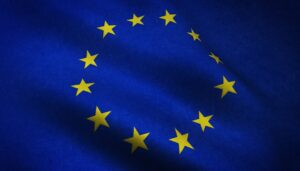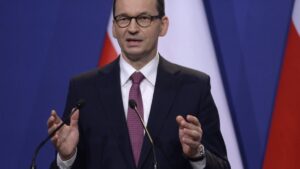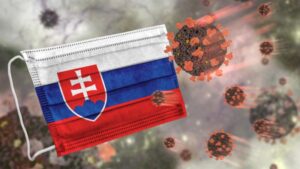
The European Union is changing the rules for crossing borders by foreigners, including Ukrainians, the press service of the Ukrainian government reports.
“Starting November 10, a new IT system EES (Entry/Exit System) will be launched at the EU borders. It will automatically record the entry and exit of all foreigners to the Schengen countries. This applies to all non-EU citizens, including Ukrainians, regardless of whether they have a visa or a visa-free regime,” the telegram channel said.
The EES system will reportedly record the biometric data of a person crossing the border once and store it for three years.
“There will be no more stamps in the passport. Registration will take place automatically through self-service terminals,” the government said.
Thus, when a person enters the EU for the first time, biometric data will be taken: fingerprints and a photo of the face.
“The border crossing time may increase by about 40 seconds while your data is being collected. The biometric data will be stored for 3 years, and you do not need to re-submit it. If you refuse biometrics, you will be denied entry. Then, every time you cross the border, you will need to scan your passport at a self-service terminal,” the statement explains.
The new system is expected to simplify border crossings, enhance security with biometric documents, and help prevent the use of fake passports and combat illegal migration.

German authorities on Monday announced a decision to introduce temporary control at all land borders of the country starting September 16 to reduce the flow of illegal migrants, the Associated Press reports citing the German Interior Ministry.
“The ministry has informed the European Union of the decision to introduce border controls on the land borders with France, Luxembourg, the Netherlands, Belgium and Denmark for six months,” the agency reports.
“We are strengthening our internal security by taking concrete measures and continue to take a tough stance against illegal migration,” German Interior Minister Nancy Feser said.
Earlier, Germany also introduced controls at the borders with Poland, the Czech Republic, Austria and Switzerland.
Germany is a member of the Schengen zone, whose members abolish border controls on internal borders. However, in case of emergency, this control is allowed to be restored for a certain period of time.

Polish Prime Minister Mateusz Morawiecki assured on Wednesday that Warsaw does not intend to open borders for agricultural products from Ukraine. “We are protecting our agriculture, so we are not opening the borders for agricultural goods from Ukraine,” Polish Radio quoted him as saying Wednesday.
“The war in Ukraine is having an increasingly serious impact on the agricultural market, and this has a negative impact on Poles, so we have imposed an embargo on goods from Ukraine,” Morawiecki said.
He admitted that “in a couple of months, the EU intends to reopen the borders for grain imports from Ukraine.”
“We do not agree to this, we will not open the borders and we will not allow destabilization of our economy. We are obliged to protect Polish interests and our agriculture,” the Polish Prime Minister emphasized.
Polish Agriculture Minister Robert Telusz said that the meeting of agricultural ministers reached an agreement and signed a petition to extend the ban on imports of four grains from Ukraine until the end of 2023.
“The restriction of grain imports from Ukraine has not affected transit. In February, corn transit amounted to 114,000 tons and in June 260,000 tons. Therefore, the European Commission’s decision to open the borders on September 15 is not meaningfully justified,” the Polish Agriculture Ministry quoted Telusz as saying on Twitter.
According to the Polish minister, the ministers of Ukraine and Moldova were invited to the meeting of agricultural ministers in Warsaw, but they could not come for objective reasons. The Polish minister expressed hope for a meeting in the future.
“We want to help Ukraine in transit. We know that this war is a war that we have to win,” Telusz said and added that it will be won when solutions will be “implemented that will help us in this.”
Poland, Hungary, Slovakia, Bulgaria and Romania, in agreement with the European Commission (EC), have banned imports of wheat, corn, rapeseed and sunflower seeds from Ukraine since May 2.
Problems for agricultural producers from a number of European countries associated with the surplus of Ukrainian grain and other agricultural products in the markets of Eastern Europe began in the first months of 2023. In many respects, they were provoked by the temporary abolition of customs duties on imports of grain and oilseeds from Ukraine by the EU. Due to this measure by Brussels, imports of agricultural products from Ukraine to the border states increased significantly.
Ukrainian products, in particular, grain, sunflower, eggs, poultry meat, sugar, apples and apple juice, berries, flour, honey and pasta in unprecedented quantities began to settle on the shelves in these countries, which led to a sharp drop in prices and hit hard the farmers in these countries.
Meanwhile, as First Deputy Prime Minister and Minister of Economy and Trade Yulia Sviridenko said on Wednesday at a meeting with the European Business Association (EBA), Ukraine is categorically against the extension of the EU’s discriminatory ban on the supply of a number of agro-commodities to Poland, Hungary, Slovakia, Bulgaria and Romania after September 15.
According to her, the ban on exports of wheat, barley, rapeseed and sunflower seeds to the above five countries is “discriminatory on the part of the nearest neighbors, especially when Ukraine has an enemy at sea.”
Asked what would happen if the ban was still extended, the first deputy prime minister said that in such a case Ukraine would be forced to consider mirror measures.
“I would not like to say out loud and believe that this is a realistic step, but we think that some mirror measures can be applied,” Sviridenko said.

Chinese authorities on Sunday began lifting border crossing restrictions in China that have been in place since the start of the COVID-19 pandemic, Bloomberg reported.
So, starting Jan. 8, individuals arriving in China will no longer need to go into quarantine after arriving in the country. However, 48 hours before arrival they will be required to obtain a negative test result for COVID-19 and present it to the PRC.
On Sunday, Chinese authorities also began issuing ordinary visas and temporary residence permits to foreigners. At the same time, residents of mainland China can again obtain passports and tourist visas.
However, according to the Associated Press, only a very limited resumption of China’s international air traffic can be expected for the time being.
Also on Sunday, authorities resumed passenger service on land and sea routes between the Chinese mainland and the Hong Kong special administrative region. Travelers, however, will need negative COVID-19 tests 48 hours before travel. The government has also imposed restrictions on the daily number of people who can travel between mainland China and Hong Kong.
The lifting of many travel restrictions came into effect after China began its annual 40-day travel period the previous day to coincide with the Lunar New Year, which this time falls on January 22, 2023. At this time, China is experiencing the world’s largest annual migration of its population, as they disperse to their homelands or travel around the country with relatives.
Since 2020, China has had a “zero tolerance” policy for COVID-19, which has meant applying measures such as lockdowns and mandatory quarantine for those who come into contact with infected people. At the same time, the Chinese economy was showing the lowest growth rate in almost fifty years. But in December, Chinese authorities lifted a series of restrictions adopted to contain the spread of the virus, causing a spike in illnesses and deaths.
The United States, the United Kingdom, India, Japan, Italy, Spain, Canada, Australia, Germany and Sweden announced some restrictive measures against travelers from China amid the COVID-19 wave. In particular, they decided to require all persons arriving from the PRC to present a negative test for COVID-19.
According to Worldometers, a portal that specializes in statistics on major world events, China has diagnosed approximately 482,000 cases of the coronavirus and 5,200 deaths from the effects of infection throughout the pandemic.

Since Monday, August 9, the Finnish authorities have opened an entrance for tourists from Ukraine, according to an interactive resource of the Ministry of Foreign Affairs of Ukraine.
“From August 9, 2021, passenger traffic between Finland and Ukraine will be normalized. All citizens of Ukraine [without exceptions] who arrive in Finland on a direct flight from Ukraine, or in transit through countries that are also included in a ‘green list’ of Finland, will be allowed to enter the territory of the country. However, quarantine requirements remain in force,” the message says.
It is specified that, in particular, all persons arriving from any third countries (including Ukraine) and who have completed a full course of vaccination against COVID-19 are exempt from mandatory testing and quarantine, provided that 14 days have passed since inoculation with the second dose of the COVID-19 vaccine.
“Finland recognizes the following vaccines: Comirnaty (Pfizer-BionTech), COVID-19 Vaccine Spikevax (formerly Moderna), Vaxzevria (formerly COVID-19 Vaccine AstraZeneca), COVID-19 Vaccine Janssen (Johnson& Johnson), BnsonIBP Sinopharm COVISHIELD, CoronaVac,” the Foreign Ministry said.
They emphasize that citizens of Ukraine who do not have confirmation of the full course of vaccination while crossing the state border of Finland must provide a certificate confirming the receipt of the first dose of the vaccine, which is recognized by Finland (it is mandatory to undergo a PCR test within 72 hours after arriving in Finland), a certificate confirming a negative result of a PCR test made in Ukraine, which was made no later than 72 hours before crossing the border (in this case, it is mandatory to undergo a PCR test 72 hours after arrival in Finland).
“Without the presence of the above documents or in the presence of confirmation that the person has had COVID-19, citizens of Ukraine will be sent to undergo a PCR test at the border control point. It is mandatory to undergo a PCR test within 72 hours after arriving in Finland,” the ministry said.
The ministry said that taking two PCR tests after arriving in Finland is free for all travelers.

The Slovak Republic opens an entrance for Ukrainian citizens who have completed a full course of vaccination against coronavirus (COVID-19), Ukrainian Foreign Minister Dmytro Kuleba has said.
“Slovakia has opened up for Ukrainians who have completed a full course of vaccination. For those who have not yet been vaccinated, entry is possible with self-isolation,” Kuleba said on his Twitter page on Wednesday.